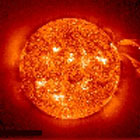 |
|||||||
|
|||||||
|
Annual General Meeting 2002:President's ReportLadies and Gentlemen, I present the Annual Report for the Lavoisier Group for the year 2001--2002. The major event for the year was the conference held on September 10th and 11th, 2001 at the Stamford Hotel here in Melbourne. It was followed by the Annual General Meeting. A few hours later the two towers of the World Trade Centre were destroyed by terrorists, and two other hijacked planes were also destroyed, one crashing into the Pentagon, the other crashing into the ground in Pennsylvania. Papers from that conference are available on our Website. Apart from the presented papers and the debates which took place at the conference, the occasion provided an important opportunity for members and friends to get together and establish networking relationships. Since the conference, The Lavoisier Group has published two pamphlets, the first entitled The Kyoto Protocol---Should Australia Ratify? and the second entitled The Kyoto Protocol and Global Warming by Sallie Baliunas, Deputy Director of the Mount Wilson Observatory and an eminent astrophysicist from the Harvard-Smithsonian Center for Astrophysics. Dr Baliunas is a key participant in the debates on global warming in the US and this monograph is an authoritative summary of the current state of greenhouse science. The Lavoisier Group has distributed these pamphlets as widely as possible, and I wish to thank those of our members who have taken on the role of proselytisers in the cause of rational argument and serious debate. Two of our members, Bob Foster and Ian Castles, represented the Lavoisier Group at a workshop conducted by the Australian Academy for Technological Sciences and Engineering (AATSE) to review an Addendum to their 1995 Report on Climate Change on April 4 last. Although our representatives were arguing against people who have invested a great deal in global warming, it was good that they able to present in person the evidence now accumulating against the Kyoto protagonists. A high proportion of the Lavoisier Group membership has qualifications and experience in science or technology, and has been drawn into this debate because of concerns about the integrity of the science which purports to justify the Kyoto Protocol, and the global regime of decarbonisation which the proponents of the Protocol, such as President Chirac of France, seek to impose. There is a new development, however, in the Kyoto debate which may be just as important as the debate about the science. One of our members, Ian Castles AO, who was formerly Australian Statistician, and who is internationally recognised for his expertise in the field of comparative statistics, took it upon himself to examine carefully the assumptions and methodology behind the IPCC's predictions of global CO2 emissions during the 21st century. These predictions provided the input data for the climate modelling which in turn led to the temperature rises forecast by the IPCC spokesmen at the Shanghai meeting in January last of between 1.4 and 5.8 degrees Celsius. What Castles found was that the assumptions and methodology used by the IPCC statistical modellers were profoundly flawed. So flawed, indeed, that the lack of integrity of the whole IPCC process is now beyond argument. At the heart of the scandal is the use of exchange rates rather than Purchasing Power Parity (PPPs) as the means of comparing economic growth trajectories. I quote from a recent article by Castles published in the Canberra Times (29.08.02) By adopting the long-discredited method of converting incomes into a common currency using current exchange rates, the IPCC modellers greatly overstated the size of the development gap, but there are two more fundamental objections to the modellers' argument. First, living standards in the developing countries in 2100 will depend on their actual economic growth during the coming century. No significant country has ever achieved a 20-fold increase in output per head in a century, let alone the 30-fold or 70-fold increases projected by the IPCC for most of the world's population. Second, and paradoxically, the IPCC's model-builders are hostile to wealth per se. They are obsessed by the belief that growth in productivity and affluence leads to unacceptable growth in greenhouse emissions. For example, they argue that 'if governments support the development of rapid growth sectors, the tendency may be to promote long-term economic growth, increase household income and consumption, and hence increase GHG emissions.' It has been difficult to persuade cabinet ministers and senior bureaucrats to consider the possibility that the science behind Kyoto is deeply flawed. This may well because there are few people with scientific or technical training within their ranks. But Ian Castles' discovery of fraudulent social science within the IPCC changes the situation. Ministers can readily understand the nature of the frauds that have been perpetrated here, and we can look forward to them facing some hard questions, requiring honest answers, in the immediate future. Peter Walsh |
|
|



